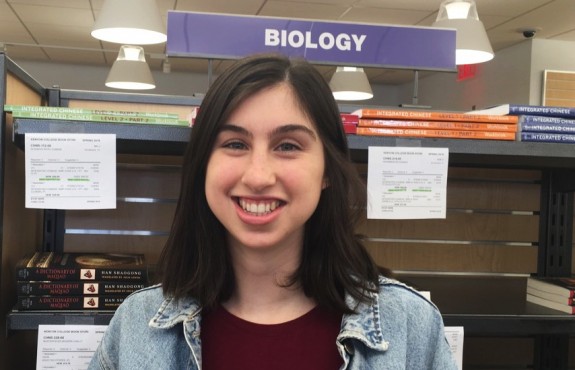
Math and Science Skills Center Tutor Grace Riley ’18 Shares Her Expertise

Kenyon students enrolled in introductory natural science courses are likely familiar with seeing their peers at the Math and Science Skills Center (MSSC). More experienced peers, though, are there to provide homework help, test preparation, and project reviews. Grace Riley ’18, a Lead Tutor (LT) for "Intro Chemistry II" who also helps students with biology, has enjoyed tutoring at the MSSC for three years. “It’s really fun to see someone figure out a complicated problem and really understand it, especially if it’s a topic I’ve learned more about in my upper-level classes,” she says.
Grace’s role as an MSSC LT started with her love of science. “I took my first year, and my professor advertised [the MSSC] as a resource to us,” she says. “The designated tutor had a visible presence in those classes, and that encouraged me to go.” As an LT, Grace attends the introductory class sessions with students, then helps them review and refine their understanding of the concepts during the MSSC’s evening hours. A typical shift for Grace at the MSSC ranges from rotating around Tomsich 101 and reaching out to students who are studying to taking a group into a separate room to work on a specific course topic.
As an MSSC tutor, Grace isn’t limited to homework help. For classes that require writing components such as lab reports, tutors provide feedback on ongoing projects. “We can really help with anything related to the course,” says Grace. Because tutors have taken Kenyon’s introductory natural science courses and are usually enrolled in upper-level courses, they have a firm grasp of the material that they can share with students.
Students enrolled in introductory science and math courses aren’t the only ones who benefit from the MSSC’s services. Grace shares how tutors' benefit academically as they get a valuable review of material during their shifts. “It’s been awesome for me to attend these classes again, because I understand the topics a lot better,” says Grace. “I’m also taking the MCAT next year, so it’s been great review for me to be revisiting these introductory concepts.” Though reviewing the range of material from various professors can be a challenge, tutors can enlist help from other LTs or General Tutors present or refer students to their professor’s office hours.
Grace explains how the peer aspect of the MSSC helps students feel comfortable with reaching out for help. “It can be a lot less intimidating to ask questions with peers than with a professor… it’s easier to express confusion about a topic.” As an MSSC tutor, though, Grace is trained thoroughly in pedagogical topics like confirmation bias, problem-solving, and stereotype threat. “It’s a fairly comprehensive training,” says Grace. “I felt very well-prepared.” Training begins before the MSSC opens each semester, which means Grace and her fellow returning tutors receive ongoing professional development.
For Grace, tutoring in the MSSC has been an investment in her future. “For medical school, it will be helpful to have a really strong foundation in these basic sciences,” she says. “It’s also been a really good experience for me from the actual tutoring aspect… learning how to explain concepts to people and working with students who are struggling with a concept that I understand has forced me to think about things and explain them in a different way.” MSSC tutors can go on to apply their collaborative skills to various professional fields, even those unrelated to STEM.
In order to be a good MSSC tutor, Grace says, an applicant has to be passionate about the sciences and experienced with introductory course material. Those who are personable and enjoy sharing their knowledge are encouraged to apply. “They’ve done well in their science courses, they’ve expressed interest in the sciences, and they have good relationships with their professors,” says Grace when describing ideal candidates.
For those interested in applying their science skills in a peer setting, the application can be found in Symplicity. The deadline to apply is April 13th.
By Amelia Yeager ’20